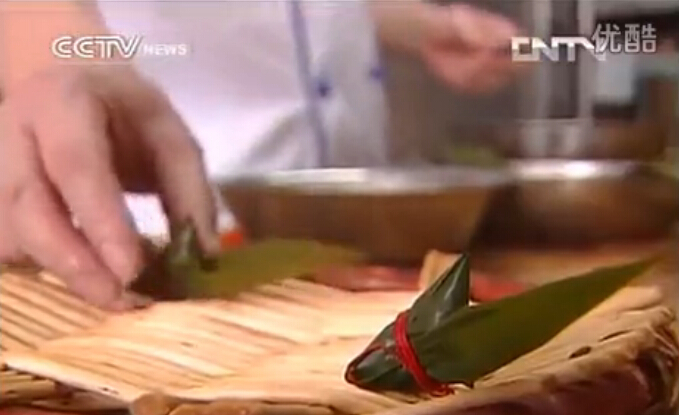(单词翻译:单击)
原味人文风情
Royal delicacies of Chinese Duanwu Holiday
端午节吃什么?
And finally, happy Dragon Boat Festival. People across China are celebrating this special occasion by eating zongzi, the glutinous rice dumpling. But besides zongzi, what other Dragon Boat dishes are you familiar with? Well, let's take a look at how Chinese emperors used to honor the festival through delicious foods eaten only on this special holiday.
最后,端午节快乐。中国各处的人民都在吃着粽子,也就是糯米团子,来庆祝这特别的节日。但除了粽子外,你还熟悉哪些其他的端午佳肴呢?嗯,来看看中国帝王过去怎么透过只能在这个特殊节日吃的美食来纪念此佳节。
Known in the West as Dragon Boat Festival, China's Duanwu Festival is also called the Double Fifth, as it falls on the fifth day of the fifth month in the Chinese lunar calendar.
在西方以龙舟庆典为人所知,中国的端午节同样也称作五月五,因为它落在中国农历第五个月的第五天。

In history, the day was considered unlucky. So Chinese people, including the royal family, often went out of their way to avoid evil spirits. This tradition lasted until the end of the Qing Dynasty.
在历史中,这天被认为是不幸的。所以中国人,包括皇族,通常外出以避开恶灵。这个传统持续到清代末期。
On this same day many years ago, the emperor and his concubines would board a boat and drop dumplings made of glutinous rice into water, honoring Qu Yuan, a famous patriotic poet who drowned.
在许多年前的同一天,皇帝和他的妻妾们会登船并将糯米做的团子丢入水中,纪念屈原--那位溺水的知名爱国诗人。
Nowadays, pastry chefs like Mr. Zhao use Duanwu festival as an opportunity to create new special snacks, while still honoring tradition. Here he's making a mini zongzi, as small as a thumb.
今天,像是赵先生这样的糕点师父将端午节当做一次创作全新特殊甜点的机会,但同时仍向传统致敬。在这里他正在制作迷你粽子,跟大拇指一样小。
For ordinary people, zongzi is always eaten with sugar. But in royal palace, things are a little bit different. Instead of sugar, they dip their zongzi into honey mixed with osmanthus flowers.
对一般人来说,粽子一直以来都是沾着糖吃的。但在皇宫里,事情有点不一样。不用糖,他们反而将粽子沾上混有桂花的蜂蜜。
For royal family, there was also a special kind of cookie that was not to be forgotten on Duanwu festival. In the past, chefs would decorate the cookie with patterns of five kinds of poisonous insects. At that time, people believed that eating the cookie would ward off evil spirits. But this year, Mr. Zhao has put a spin on the decoration to lighten things up, switching the old pattern for five kinds of flowers.
对皇族来说,还有一种在端午节不能被遗忘的特殊糕饼。在过去,大厨们会用五种毒虫的图形装饰糕饼。在那时,人们相信吃下那些糕饼就能除去恶灵。但今年,赵先生在装饰上动了点手脚让气氛轻松一点,将过去的图形改成五种花的图形。
For the Chinese, Duanwu is not just a three-day holiday. It's a tribute to Chinese history and traditions, which have been lasted for thousands of years.
对中国人来说,端午不只是一段为期三天的假期。它是对中国历史及传统的礼赞,那已经流传数千年了。
内容重点讲解
概念点拨:
端午节起源:端午节源于对恶日(即农历五月,因仲夏瘟疫流行而得名)的禁忌,也是祭龙的节日,许多盛行于世的端午习俗都有驱瘟避疫的成分。虽然中国的端午节常视为纪念楚国诗人屈原与吴国忠臣伍子胥的节日,但不少习俗在之前即已流传,而且不少学者如闻一多考证在屈原投江之前,吴越一带已有端午节存在。
端午节最重要的两项活动——竞渡和吃粽子,都和龙有关(见闻一多《神话与诗》的《端午考》),可能是迎涛神祭图腾的习俗。相传古代中国南方吴越人(今江浙一带)认为自己是龙的传人,每年五月初五举行祭图腾仪式,以求来年风调雨顺、大丰收。他们把食物裹在树叶或装在竹筒中(即现在的粽子),投到江里去。后来他们还有在这天划着独木舟拜访亲朋好友的做法。高兴时就即兴举行独木舟赛,慢慢演变成今天过端午节这种习俗。


